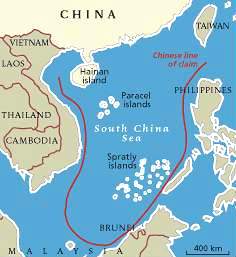Vietnam and China share a border and an Ocean, over which conflict has erupted over the centuries. The last overt war the two nations fought was in the 70's; China called it, 'teaching Vietnam a lesson.' The conflict raged for a few weeks before China was satisfied that Vietnam had learned its lesson (and place).

China easily pushed into Vietnam across their mutual border; Vietnam offered little resistance against the Asian superpower. Relations between the two nations have been cool ever since.
Today however, the situation has heated up considerably. Disputes have arisen over ownership rights around the resource rich Spratly Islands and Paracel island group.
In an extraordinary display of short memory, Hanoi has welcomed the assistance of former enemy, America; which is hoping to establish a huge naval presence in the region in order to thwart China's dominance and prevent it from exploiting oil and gas deposits that 'rightfully belong' to America!
Aggregated report from CommonDreams follows:
US To Heavily Increase Warships in Asia
Secretary of Defense Leon Panetta has announced that the US will be shifting the majority of its naval fleet to the Pacific by 2020, in a "steady, deliberate" effort to increase US presence in the area 'vital to America's future'.
"By 2020, the Navy will re-posture its forces from today's roughly 50/50 percent split between the Pacific and the Atlantic to about a 60/40 split between those oceans. That will include six aircraft carriers in this region, a majority of our cruisers, destroyers, littoral combat ships, and submarines...to project power and operate in the Asia-Pacific," Panetta stated on Saturday at the Shangri-La Dialogue summit in Singapore.
"The speech appeared designed to reassure allies worried about Beijing's more assertive stance in the South China Sea that Washington will back its much-publicized "pivot" to Asia with concrete action," Agence France-Presse reports today.
Panetta said the United States is "paying close attention to the situation in Scarborough Shoal in the South China Sea," where the Philippines and China are currently at an impasse over territorial rights in the resource-rich South China Sea.
* * *
Agence France-Presse reports:
US to Shift Most of Naval Fleet to Pacific by 2020
The United States will shift the majority of its naval fleet to the Pacific by 2020 as part of a new strategic focus on Asia, Pentagon chief Leon Panetta told a summit in Singapore.
The decision to deploy more ships to the Pacific Ocean, along with expanding a network of military partnerships, was part of a "steady, deliberate" effort to bolster the US role in an area deemed vital to America's future, he said on Saturday.
And he insisted the switch in strategy was not a challenge to China, saying it was compatible with the development and growth of the fast-growing Asian power. [...]
The US Navy currently has a fleet of 285 ships, with about half of those vessels deployed or assigned to the Pacific.
Although the total size of the overall fleet may decline in coming years depending on budget pressures, Pentagon officials said the number of naval ships in the Pacific would rise in absolute terms.
The United States also planned to increase the number of military exercises in the Pacific and to conduct more port visits over a wider area extending to the Indian Ocean.
Panetta was speaking to mainly Asian defence officials and officers from 27 countries at the Shangri-La Dialogue, a summit organized by the London-based International Institute for Strategic Studies. [...]
The United States planned new investments in capabilities needed "to project power and operate in the Asia-Pacific," including radar-evading fighter jets, a new long-distance bomber, electronic warfare and missile defenses, he said.
"But make no mistake -- in a steady, deliberate, and sustainable way -- the United States military is rebalancing and is bringing an enhanced capability and development to this vital region," he added.
* * *
Reuters reports:
US Will Put More warships in Asia: Panetta
[...] "We're not naive about the relationship and neither is China," Panetta told the Shangri-La Dialogue attended by senior civilian and military leaders from about 30 Asia-Pacific nations.
"We also both understand that there really is no other alternative but for both of us to engage and to improve our communications and to improve our (military-to-military) relationships," he said. "That's the kind of mature relationship that we ultimately have to have with China."
Some Chinese officials have been critical of the U.S. shift of military emphasis to Asia, seeing it as an attempt to fence in the country and frustrate Beijing's territorial claims. [...]
The trip, which includes stops in Vietnam and India, comes at a time of renewed tensions over competing sovereignty claims in the South China Sea, with the Philippines, a major U.S. ally, and China in a standoff over the Scarborough Shoal near the Philippine coast.
http://www.commondreams.org/headline/2012/06/02-0

by staff report via stan 2012-06-03 09:53:07
US Defence Secretary Leon Panetta will travel on Sunday to Vietnam’s Cam Ranh Bay, a major base for American forces in the Vietnam War, underscoring improved ties between the former enemies.
Panetta is the most high-ranking US official to visit Cam Ranh Bay since the end of the Vietnam War in 1975.
The two countries signed a memorandum on defence cooperation last year and Panetta planned to discuss how to carry out the agreement during his two-day visit, officials said.
“We’ve had a great trajectory with Vietnam over a number of years,” said a senior US defence official, who spoke on condition of anonymity.
“Seventeen years into normalisation of relations, we really have a robust relationship with the Vietnamese government as a whole and our mil-to-mil (military) relationship is really healthy as well,” the official said.
Cam Ranh Bay airfield, one of three main hubs used by US forces in the war, once hosted squadrons of fighter jets, cargo planes and troops at the height of the Vietnam conflict.
The Vietnamese handed over the air base and naval port to the Soviet Union after the war, with Moscow deploying fighter jets, nuclear submarines and a spy station during the Cold War.
The Russians left the base in 2002 and Vietnam has decided to open the port on a commercial basis to foreign naval ships to resupply and undergo repair work.
Panetta was due to visit an American naval cargo ship currently at the port, the USNS Richard E. Byrd, which moves cargo for the naval fleet with a mostly civilian crew, officials said.
The Cam Ranh Bay base lies in of one of the region’s best natural harbours and the United States sees it an ideal spot to bolster an American naval presence in the strategically vital South China Sea.
China claims all of the South China Sea, which is believed to encompass huge oil and gas reserves. One-third of global seaborne trade passes through the region.
Hanoi and Beijing have rival claims to the Spratly Islands and a long-standing dispute over the Paracel island group.
A more aggressive approach from China in the South China Sea has prompted Vietnam to forge closer defence cooperation with its former foe the United States, analysts say.
“Vietnam is arguably the crucial swing swing state when it comes to the South China Sea,” according to a recent report from the Center for a New American Security, a US-think tank with close ties to President Barack Obama’s administration.
“If Vietnam does not resist China’s rising power, weaker and less assertive states such as the Philippines have little chance of blocking Chinese hegemony,” said the report.
On a nine-day regional tour, Panetta’s visit to Vietnam follows a speech on Saturday at a security summit in Singapore in which he said the US Navy would shift the majority of its ships to the Pacific by 2020, as part of a strategic focus on Asia.
© 2012 AFP
Leon Panetta, Secretary of Defense
http://www.rawstory.com/rs/2012/06/02/panetta-to-visit-former-u-s-base-in-vietnam/